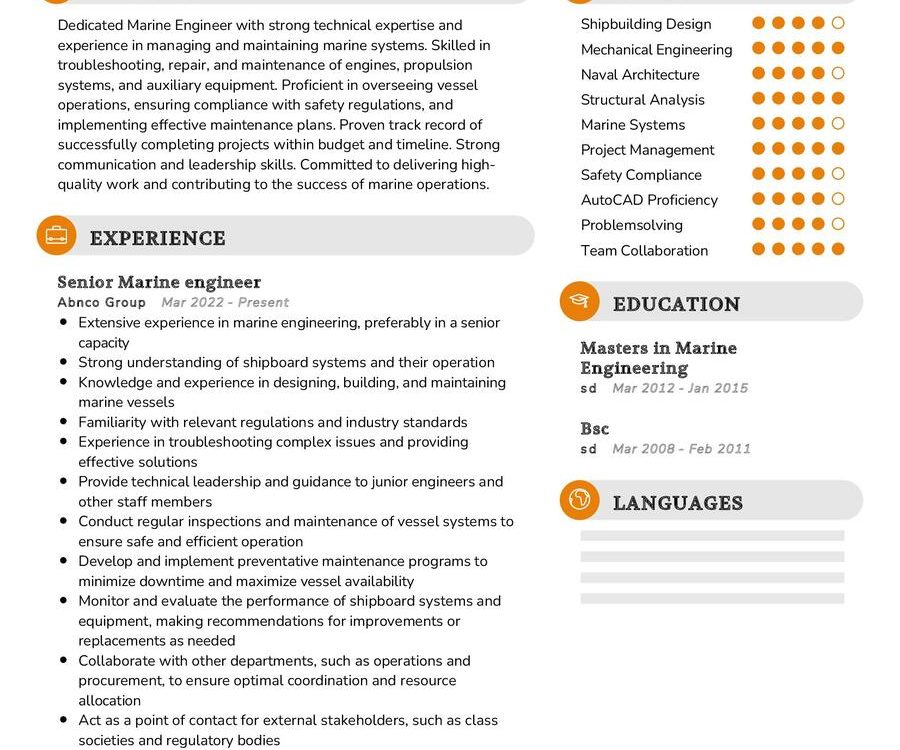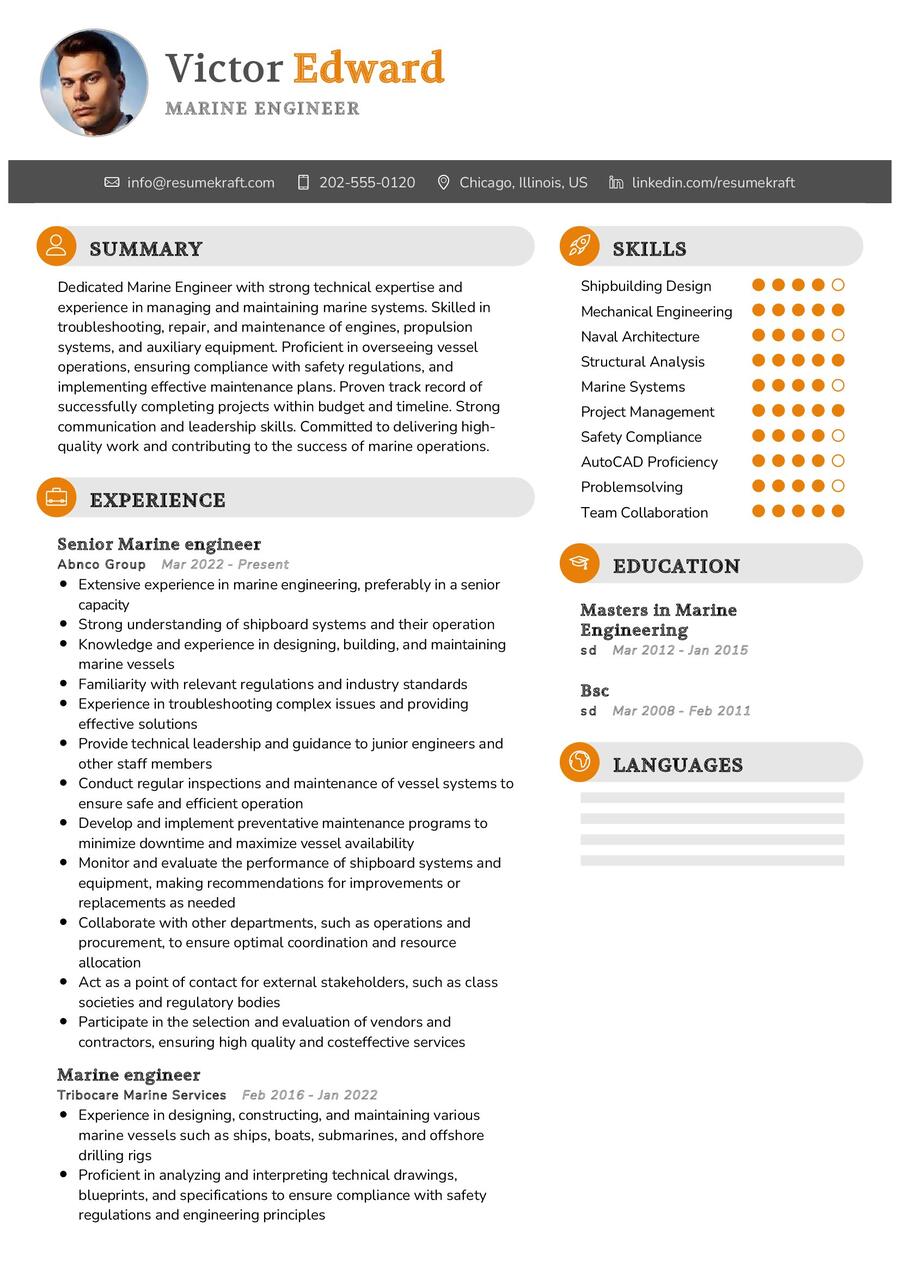Exploring the Role of a Marine Engineer
As the maritime industry continues to navigate through waves of technological advancements and global challenges, the role of a Marine Engineer stands out as crucial in ensuring the smooth operation and maintenance of vessels. This article will delve into the multifaceted responsibilities, job requirements, and skills essential for a career as a Marine Engineer.
Job Requirements for a Marine Engineer
Embarking on a career as a Marine Engineer requires meeting specific educational and experiential criteria. Let’s delve into the prerequisites for this role:
- A Bachelor’s degree in Marine Engineering, Naval Architecture, or a related field, providing a strong foundation in the technical aspects of ship design and maintenance.
- Comprehensive knowledge of marine systems, propulsion, and navigation, showcasing a deep understanding of the complexities of maritime engineering.
- Hands-on experience in marine engineering projects, demonstrating a trajectory of increasing responsibility and proficiency in problem-solving.
- Leadership and teamwork skills, honed through experiences in collaborative projects and possibly through relevant courses and certifications.
- Proficiency in relevant software tools for marine design and simulation, a critical skill in the modern marine engineering landscape.
- Adaptability to work in diverse and challenging environments, a trait developed through exposure to different marine projects and conditions.
Securing additional certifications in maritime safety, environmental regulations, or specialized technical areas can enhance your profile in this competitive field.
Responsibilities of a Marine Engineer
The role of a Marine Engineer is a dynamic blend of technical expertise and operational oversight. Let’s unravel the core responsibilities that define this crucial role:
- Designing and maintaining propulsion systems, ensuring optimal performance and efficiency of marine vessels.
- Overseeing the installation and repair of engines, navigation systems, and other crucial components of ships.
- Collaborating with naval architects and shipbuilders to ensure that vessels meet safety and regulatory standards.
- Conducting regular inspections and maintenance to prevent and address mechanical issues, ensuring the seaworthiness of vessels.
- Leading and coordinating engineering teams during the construction or modification of marine structures.
- Staying abreast of emerging technologies in marine engineering and recommending innovations for improved vessel performance.
- Ensuring compliance with maritime regulations, environmental standards, and industry best practices.
Each responsibility presents its unique challenges, contributing to the overall success and safety of marine operations.
Resume Writing Tips for a Marine Engineer
Crafting a compelling resume is crucial in presenting your skills and experiences effectively. Here are some tips to create a standout Marine Engineer resume:
- Highlight leadership roles, showcasing instances where you led engineering teams to successful project completion.
- Detail specific projects you’ve worked on, emphasizing the impact they had on vessel efficiency, safety, or environmental sustainability.
- Include metrics to quantify your achievements, providing a tangible representation of your contributions to maritime projects.
- List relevant certifications and courses, demonstrating your commitment to staying updated on industry standards and advancements.
- Personalize your resume for the specific job application, aligning your skills and experiences with the employer’s requirements.
Your resume is a reflection of your journey as a Marine Engineer, showcasing your expertise and commitment to the maritime industry.
Resume Summary Examples for a Marine Engineer
Your resume summary serves as the introduction to your career story. Here are some examples to inspire you:
- “Experienced Marine Engineer with over a decade in propulsion system design and maintenance, adept at leading teams to ensure vessel efficiency and compliance with maritime standards.”
- “Innovative Marine Engineer specializing in environmentally sustainable ship designs, proven track record in implementing cutting-edge technologies for enhanced maritime operations.”
- “Detail-oriented Marine Engineer with a focus on safety and compliance, leading successful inspections and maintenance projects to ensure the seaworthiness of vessels.”
Your resume summary is your chance to make a lasting impression, encapsulating your expertise and value as a Marine Engineer.
Create a Strong Experience Section for Your Marine Engineer Resume
The experience section is the heart of your resume, narrating your journey through various marine engineering projects. Here are examples to guide you:
- “Led a team in the design and implementation of a new propulsion system, resulting in a 15% improvement in fuel efficiency for a cargo vessel.”
- “Coordinated the retrofitting of an existing fleet to meet updated environmental standards, ensuring compliance and reducing the company’s carbon footprint.”
- “Managed the installation of navigation systems on a series of offshore drilling platforms, enhancing safety and navigation accuracy.”
Your experiences are the chapters of your career story, illustrating your impact on marine engineering projects.
Education Section for Your Marine Engineer Resume
Your educational background is a cornerstone in your journey as a Marine Engineer. Here’s how you can present it:
- Bachelor of Science in Marine Engineering, XYZ University, a comprehensive program providing a strong foundation in marine systems and design, 2012.
- Master of Engineering in Naval Architecture, ABC University, specializing in advanced ship design and propulsion, 2015.
- Marine Engineering Certification, Maritime Institute, showcasing additional specialized training in marine engineering technologies, 2016.
Your education is the bedrock of your expertise, providing the knowledge necessary for success in the field of marine engineering.
Key Skills for a Marine Engineer Resume
Your skill set is your toolkit, containing the expertise essential for effective marine engineering. Let’s outline the key skills for a Marine Engineer:
Technical Skills:
- Ship propulsion system design and maintenance.
- Knowledge of marine systems and navigation.
- Proficiency in marine design and simulation software.
- Understanding of maritime safety and environmental regulations.
- Project management for marine engineering projects.
Soft Skills:
- Leadership and team management in marine engineering settings.
- Effective communication for collaborative projects.
- Problem-solving in challenging maritime scenarios.
- Attention to detail in inspection and maintenance tasks.
- Adaptability to diverse and dynamic marine environments.
Each skill is a tool in your arsenal, contributing to your effectiveness as a Marine Engineer.
Common Mistakes to Avoid When Writing a Marine Engineer Resume
Avoiding common pitfalls is crucial when crafting your resume. Here are mistakes to steer clear of:
- Using generic language, failing to showcase your unique contributions to marine engineering projects.
- Focusing solely on job duties, neglecting to highlight specific achievements and their impact.
- Underestimating the importance of a cover letter, missing an opportunity to personalize your application and connect with potential employers.
- Overloading your resume with technical jargon, potentially alienating readers who may not have an in-depth understanding of maritime engineering.
- Neglecting proofreading, a mistake that can undermine your professional image.
Avoiding these mistakes will help you create a resume that effectively communicates your value as a Marine Engineer.
Key Takeaways for Your Marine Engineer Resume
As we conclude this comprehensive guide, remember these key points when crafting your Marine Engineer resume:
- Emphasize leadership experiences, showcasing successful projects and the impact on vessel efficiency and safety.
- Showcase technical proficiency, emphasizing your expertise in ship design, propulsion systems, and maritime safety.
- Detail strategic initiatives, illustrating your role in implementing innovative technologies for improved maritime operations.
- Include a section on continuous learning, highlighting certifications and courses that demonstrate your commitment to staying current in the field.
With these insights and tips, you’re well-equipped to craft a resume that tells the story of your journey as a Marine Engineer, highlighting your skills, experiences, and aspirations. Best of luck!
Finally, feel free to utilize resources like AI Resume Builder, Resume Design, Resume Samples, Resume Examples, Resume Skills, Resume Help, Resume Synonyms, and Job Responsibilities to create a standout application and prepare for the Marine Engineer job interview.


